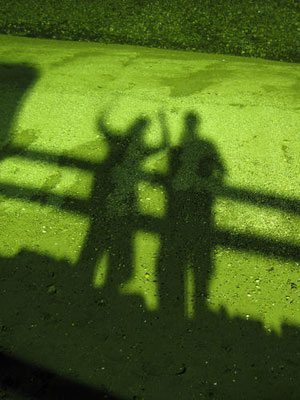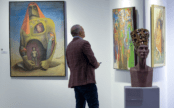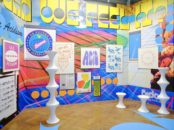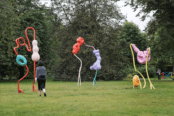Well, here it is. Out of Terminal 5 and onto the plane, and straight away it feels like Nigeria.
Not that I thought that then. Everyone’s brought twice as much hand luggage as they should have, so the overhead lockers are full before half the passengers are on board. I have to store my laptop bag 15 rows behind where I’m sitting (which proves to be a right bastard when leaving the plane – fighting a tide of humanity like a salmon going upriver at 4.30am as everyone scrummages to get off), but I’m just happy to get it in somewhere.
 The staff are mostly rude in the extreme, and I’ve since heard it extemporized that this is because BA have a near monopoly on the very popular Abuja route. We might not be the masters any more, but it doesn’t mean we have to be nice to you. The meal schedule seems designed to allow you as little time to sleep as possible, but I eat it anyway, both the roast beef(ish) dinner at 1am and the weird ham roll at 3.30. Still, at least they’re liberal with the red wine.
The staff are mostly rude in the extreme, and I’ve since heard it extemporized that this is because BA have a near monopoly on the very popular Abuja route. We might not be the masters any more, but it doesn’t mean we have to be nice to you. The meal schedule seems designed to allow you as little time to sleep as possible, but I eat it anyway, both the roast beef(ish) dinner at 1am and the weird ham roll at 3.30. Still, at least they’re liberal with the red wine.
The guy sitting next to me starts to mumble incoherently and twitch violently as we taxi for take off. His weird physical tourette’s seems to involve throwing pinched fingers outwards at the seat in front, as if delivering an exorcism, and always results in me taking an elbow somewhere. No apologies, or even any direct address. I can’t work out if he’s talking in his sleep, practising a speech (he has a heavily scribbled journal in his lap), or just plain mental. By the third time on the flight that this little drama is performed, I’m plumping for the latter.
Shortly before landing, when he mumbles loud enough for me to catch the words, I realise he’s actually praying. This does make me feel slightly better, but I’m tired as hell by this point, so just idly wonder whether his intercessions to the Good Lord have had any beneficial impact. Certainly a smooth flight, but I could have done without the bruised ribs.
As we land, Pastor Peter K.C. Adeyemi (Prevailing Word & Prayer Ministries Inc.) becomes inexplicably friendly and interested. At 4.30am (to my body clock) and after 45 minutes sleep, I find this pretty hard to deal with. He gives me his card and says he wants to correspond, but I haven’t heard a word from him yet.
They nearly don’t let me in. “You have the wrong sort of visa for this sort of consultancy.” I didn’t know what to say so I said nothing, although that was at least partly because I felt like I was about to fall over. Were they angling for a bribe? At the time this didn’t occur to me, which was probably a good thing, as, on reflection, attempting my first dash at customs having been in the country for 10 minutes was probably not the best idea. The female army officer says they’ll give me a month (which is apparently all they’d give me anyway), and I just mutely nod and trundle off, sweating gently.
Abdul meets me, and a journey through crazy traffic ensues. 6.30am and 34 degrees (43 by the time we arrive, two hours later). We end up driving round 4 lanes of solid traffic on the verge, which is more like a huge motocross track, along with a whole stream of other vehicles, nearly scraping the bottom of the car off 3 times. Some little kids see me and burst into hilarity, shouting “Oyibo!”. Get close to the city and drive into a huge cloud of smog, which I haven’t yet left.
I wish I’d written down the Radio Nigeria tagline. It was superb. Unfortunately I heard it half way through this horrendous first journey, and I’d forgotten it almost before I’d made the mental note to write it down, although I do remember that it was a fantastically high minded mission statement for a radio station – uniting the country and achieving the aims of God and law, or something along those lines. I’d love to hear Chris Moyles say that on Radio 1.
***
 The university is off the main road to the airport, and the access road has not yet been built. The signpost is tiny and looks like it’s made out of cardboard, although I think it must be wood in reality. Beyond that, a good half a mile of gravel tracking that winds past the construction site for a new bit of motorway and a new private hospital that is apparently going well, although I’m not sure how you’re supposed to tell. Shortly after the hospital you enter groves of cashew trees, most of which are around 4 feet high, and growing in rows in what looks like a cross between a ploughed field and an extremely orderly grid of little mounds. I don’t know why the field is laid out like this, but I think it’s something to do with earth being washed away if you just leave it flat. I’m basing that purely on the description of farming in the Congo from The Poisonwood Bible, so if I’m wrong, blame Barbara Kingsolver.
The university is off the main road to the airport, and the access road has not yet been built. The signpost is tiny and looks like it’s made out of cardboard, although I think it must be wood in reality. Beyond that, a good half a mile of gravel tracking that winds past the construction site for a new bit of motorway and a new private hospital that is apparently going well, although I’m not sure how you’re supposed to tell. Shortly after the hospital you enter groves of cashew trees, most of which are around 4 feet high, and growing in rows in what looks like a cross between a ploughed field and an extremely orderly grid of little mounds. I don’t know why the field is laid out like this, but I think it’s something to do with earth being washed away if you just leave it flat. I’m basing that purely on the description of farming in the Congo from The Poisonwood Bible, so if I’m wrong, blame Barbara Kingsolver.
These cashew trees belong to (although I’m not sure if that is the right phrase – perhaps it is more accurate to say that these cashew trees are “farmed by”) a small village that has been allowed to remain just outside the gates of the campus. It is strange to be driving to a building full of flat screen PCs and palatial air conditioned offices, when you see the collection of traditional thatched huts that sit literally right outside. I find something strangely comforting about it though, and I don’t know if that feeling is an admirable one, or just some hideous colonial condescension that instead of seeing poverty, sees “authenticity” or some other such awful self-deception.
Although the description of the offices as “palatial” is perhaps only tangentially accurate. In terms of size, certainly, they are ridiculously luxurious – far larger than any academic equivalent in the UK. And the equipment is also brand new and first class, as are the trimmings of those offices that are finished. There is more art on the walls here than I have seen in any university, and it is of fantastic standard – beautiful expressionist canvases in violent colours, and with plenty of what one of my old tutors would have called “crumbling impasto”. Yet so many of the finishing touches to the building itself are missing – from the plugs hanging out of walls, to the bowed ceilings, and the ceiling in the hallways that hasn’t even been installed yet. I really like it here, but there’s something revealing in the mixture of the excellent and the disregarded. Not to mention that the power’s rarely on, we’ve only got enough dongles for two of us to use the internet at any one time, and everything outside looks like a building site. There’s a hell of a lot to do here, but then that’s all part of the fun.
“Frontier work” is how my colleague Keith described the project, and I know what he means. “If we can set up a university here, we should be able to do it anywhere”. I think he’s right on that score too. Let’s see how we get on…


















